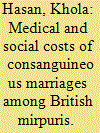|
|
|
Sort Order |
|
|
|
Items / Page
|
|
|
|
|
|
|
| Srl | Item |
| 1 |
ID:
091735


|
|
|
|
|
| Publication |
2009.
|
| Summary/Abstract |
Consanguineous marriage has been widespread within the Pakistani Mirpuri community in Britain today. Such marriage arrangements are now increasingly perceived to create various problems and harms, including a high degree of insularity with barriers to integration and lack of contact with the wider community. Many instances of forced marriage give rise to human rights concerns. Since such marriages are often arranged with partners from Pakistan to aid the extended family financially, large-scale immigration from Pakistan into Britain continues. Many of these new spouses cannot speak English and are unfamiliar with English culture, which continues to slow down the pace of integration of Mirpuris. The article highlights particularly that the rates of consanguineous marriage are increasing within this particular community despite awareness of the medical risks involved, including an increase in congenital defects and infant mortality. Serious and culturally sensitive thought needs to be given on all sides, therefore, to addressing such issues rather than infl ating controversies and damaging community relations.
|
|
|
|
|
|
|
|
|
|
|
|
|
|
|
|
| 2 |
ID:
193312


|
|
|
|
|
| Summary/Abstract |
At 5:30 in the evening of March 4, 1959, Dr. John Reuben Sheeler stood in front of the Karachi Press Club and delivered a lecture titled, “The American Negro Today.”1 Sheeler told the audience of thirty-five Pakistani press corps members that despite a long history of disfranchisement and lynching in the U.S. South, World War II was a turning point in according African Americans greater rights.2 One of the journalists retorted, “Is the Negro American aware that he does not have to continue toleration of white man’s injustices, that by color he need [no] longer be a scared minority?”3 Marking the occasion of the sesquicentennial celebration of U.S. President Abraham Lincoln’s birth, Sheeler’s task as professor and cultural ambassador was to teach the history of African Americans, Lincoln, and U.S. race relations.4 The U.S. State Department authorized Sheeler to serve as an American Specialist, with a broader diplomatic purpose of “develop[ing] understanding between nations, especially between America and other countries.”5 Professor Sheeler embarked on a lecture tour of Scandinavia and South Asia from January 26 to May 1, 1959.6 He traveled to Denmark, Norway, and Sweden but his tour commenced in an entirely different place: Dacca, East Pakistan.7 Sheeler remained in East and West Pakistan for a total of six weeks in February and March, delivering twenty-eight lectures about African American life and the evolving civil rights struggle.8 He also met with ten discussion groups, held six newspaper interviews, and convened privately with individuals and small groups throughout Pakistan.
|
|
|
|
|
|
|
|
|
|
|
|
|
|
|
|
| 3 |
ID:
145866


|
|
|
|
|
| Summary/Abstract |
With the emergence of an adult generation of descendants of migrants who are entering the labour market, marrying and having children, questions of transnationalism are made current in new ways. This article engages in the discussion of transnationalism and ‘the second generation’ by taking the everyday life of families as a starting point for discussing the role and meaning of what can be defined as transnational practices. The practice in question is the use of online Quran courses among families of Pakistani background in Norway. Employing Levitt and Glick Schiller’s distinction between ways of being and ways of belonging in transnational social fields, this article discusses how to understand this practice and its transnational dimensions.
|
|
|
|
|
|
|
|
|
|
|
|
|
|
|
|
|
|
|
|
|